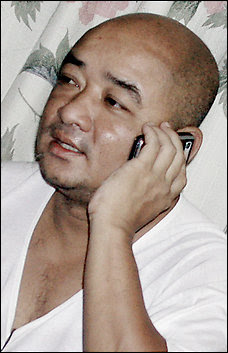 BANGKOK, June 6 -- In the weeks after Tropical Cyclone Nargis battered Burma's Irrawaddy Delta, Burma's most famous comedian -- a dentist known by his stage name, Zarganar, or "Tweezers" -- spearheaded efforts by about 400 Burmese artists to collect and distribute food, mosquito nets, blankets and other supplies to destitute survivors.
BANGKOK, June 6 -- In the weeks after Tropical Cyclone Nargis battered Burma's Irrawaddy Delta, Burma's most famous comedian -- a dentist known by his stage name, Zarganar, or "Tweezers" -- spearheaded efforts by about 400 Burmese artists to collect and distribute food, mosquito nets, blankets and other supplies to destitute survivors. His initiative was one of many spontaneous private operations by concerned Rangoon residents -- including businesspeople, students, monks and local journalists -- that brought some measure of help to cyclone victims as U.N. agencies struggled with Burma's military government to get aid into the devastated region.
Long known for sharp comic jibes at the military rulers, Zarganar also spoke publicly in stark terms about the inadequacy of their cyclone relief effort, the physical difficulties and psychological trauma of the victims and the appalling conditions in the delta.
On Wednesday night, Zarganar was taken into custody by Burmese authorities, who insist that the relief phase of the emergency is over. The state-owned New Light of Myanmar newspaper, meanwhile, lashed out at "unscrupulous" elements that it said were exaggerating the problems in the delta.
Human rights groups say the detention of the high-profile figure and the effort to gloss over the extent of the disaster highlight the precedence Burma's rulers are giving to political concerns at the expense of the welfare of an estimated 2.5 million cyclone victims.
"By detaining him, it sends a message of real intimidation to people who the regime thinks could use the humanitarian disaster for political purposes," said Benjamin Zawacki, a researcher with Amnesty International.
More than a month after the cyclone hit, more than 1 million survivors, especially in remote, hard-to-reach areas of the delta, have received no assistance as they try to rebuild their lives, the United Nations says.
Even people in bigger towns and more accessible villages have received only "very basic assistance, which is inadequate and below minimum requirements," according to the latest U.N. update on the disaster relief effort.
Many of the victims are suffering from deep psychological trauma in addition to shortages of food, water and other support. Kaz de Jong, a trauma specialist with the medical charity Doctors Without Borders who just spent two weeks in the disaster zone, said many survivors are having trouble sleeping, lack energy or motivation and are haunted by images of the moment they lost their loved ones.
"What I've seen is a lot of people who are very sad, very anxious and very afraid that the wind will blow away everything that's left," he told journalists in Bangkok. The concerns about mental health add to fears of a second wave of deaths caused by disease, due to the lack of clean water, soap and basic sanitation facilities.
So far, Doctors Without Borders says, its 40 medical teams in the delta have not detected any sign of outbreaks, though risks remain high.
International aid organizations that were already working in Burma have stretched their local staff capacity to the limit and are trying to rapidly expand. Other groups, such as Oxfam, are still struggling to secure clearance to work in the country.
"A disaster of this scale requires an enormous number of actors in the field," said Guy Chase, deputy country director in Burma of Save the Children. "There is so much need -- we are still reaching villages that have had almost nothing since the cyclone hit and that need food, water and shelter. There should be more people here with more stuff."
Critics blame the insufficiency of the aid effort on the Burmese junta's obsession with politics and security. "They have continually said that aid should not be politicized, but they have been politicizing it since the get-go," Zawacki said. "The root cause of their response to the cyclone, which was obstruction, negligence and a failure to deploy their own forces, is political."
In the immediate aftermath of the disaster, the government deployed only limited numbers of its armed forces to help, opting to keep much of its manpower elsewhere to maintain security ahead of a controversial constitutional referendum just a week after the disaster.
Amnesty says the government has also been pushing cyclone survivors out of temporary shelters in towns back toward their villages, and out of Buddhist monasteries amid speculation that officials don't want victims mingling too much with monks who were at the center of anti-government demonstrations in September.
The government, deeply suspicious of the outside world, also rejected offers of foreign military logistical support.
But a 200-member team -- led by the Association of Southeast Asian Nations and the United Nations -- has begun a mission to assess needs, with the support of 18 staffers from the World Bank and eight from the Asian Development Bank.
Source
No comments:
Post a Comment